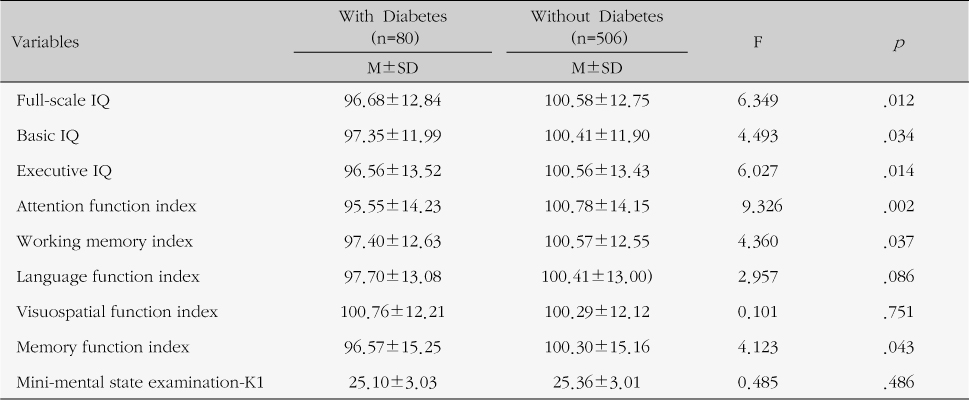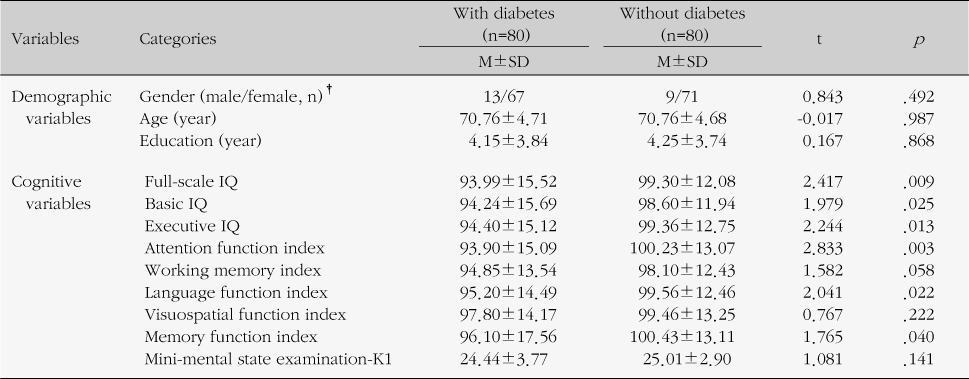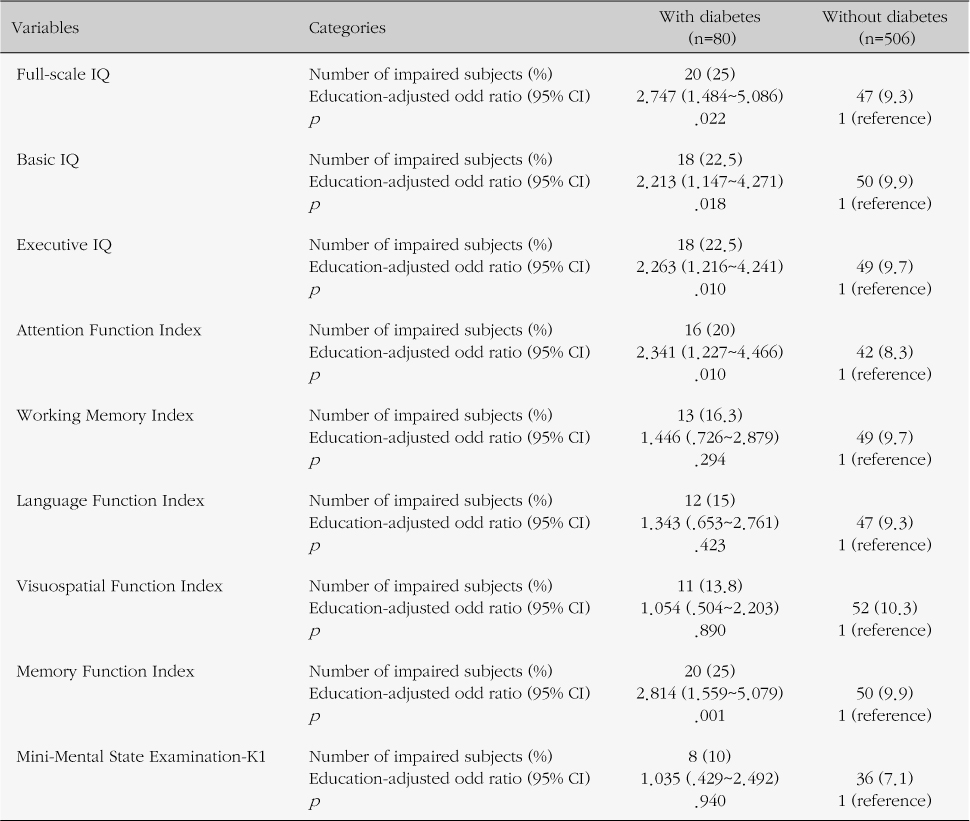Articles
- Page Path
- HOME > J Korean Acad Community Health Nurs > Volume 22(4); 2011 > Article
-
Original Article
- Diabetes and Cognitive Function in Community-Dwelling Older Adults
- Yongsuk Kim
-
Journal of Korean Academy of Community Health Nursing 2014;22(4):377-388.
DOI: https://doi.org/10.12799/jkachn.2011.22.4.377
Published online: April 4, 2014
Full-time Lecturer, Department of Nursing, Daegu Haany University, Korea.
• Received: July 12, 2011 • Revised: December 5, 2011 • Accepted: December 6, 2011
© 2011 Korean Academy of Community Health Nursing
This is an Open Access article distributed under the terms of the Creative Commons Attribution Non-Commercial License (http://creativecommons.org/licenses/by-nc/3.0/) which permits unrestricted non-commercial use, distribution, and reproduction in any medium, provided the original work is properly cited.
- 354 Views
- 0 Download
Abstract
-
Purpose
- This study was to examine the relation between diabetes and cognitive function in older adults.
-
Methods
- Eighty community-dwelling patients with diabetes and 506 subjects without diabetes were studied with cognitive function test. Cognitive function was measured by Full-scale IQ, Basic IQ, Executive IQ, Attention Function Index, Working Memory Index, Language Function Index, Visuospatial Function Index, Memory Function Index, and MMSE-K1.
-
Results
- In model controlling for education, the diabetic group showed significantly lower scores than the non-diabetic group in in Full-scale IQ (p=.012), Basic IQ (p=.034), Executive IQ (p=.014), Attention Function Index (p=.002), Working Memory Index (p=.037), and Memory Function Index (p=.043). The diabetic and non-diabetic groups that were matched for gender, age, and education showed similar differences in 7 out of 9 cognitive measures. The impairments of Full-scale IQ and Memory Function Index in the diabetic group were, respectively, 2.7 and 2.8 times greater than that in the diabetic group.
-
Conclusion
- These results showed that diabetes should be considered to a factor of cognitive impairment in older adults.
Table 1Demographic and Cognitive Characteristics of Older Adults With versus Without Diabetes (N=586)


Table 2Cognitive Function of Older Adults With versus Without Diabetes Adjusted for Education Level (ANCOVA results) (N=586)


- 1. Arvanitakis Z, Wilson RS, Li Y, Aggarwal NT, Bennett DA. Diabetes and function in different cognitive systems in older individuals without dementia. Diabetes Care. 2006;29(3):560–565. ArticlePubMedPDF
- 2. Barnes LL, Wilson RS, Schneider JA, Bienias JL, Evans DA, Bennett DA. Gender, cognitive decline, and risk of AD in older persons. Neurology. 2003;60(11):1777–1781. ArticlePubMed
- 3. Choi JH, Kim HK, Kim DM. Cognitive function in older patients with diabetes mellitus. J Korean Geriatr Soc. 2002;6(1):41–47.
- 4. Debling D, Amelang M, Hasselbach P, Stümer T. Diabetes and cognitive function in a population-based study of elderly women and men. J Diabetes Complications. 2006;20(4):238–245. ArticlePubMed
- 5. Ebady SA, Arami MA, Shafigh MH. Investigation on the relationship between diabetes mellitus type 2 and cognitive impairment. Diabetes Res Clin Pract. 2008;82(3):305–309. ArticlePubMed
- 6. Folstein MF, Folstein SE, McHugh PR. "Mini-mental state": A practical method for grading the cognitive state of patients for the clinician. J Psychiatr Res. 1975;12(3):189–198. PubMed
- 7. Ganguli M, Snitz BE, Lee CW, Vanderbilt J, Saxton JA, Chang CC. Age and education effects and norms on a cognitive test battery from a population-based cohort: The monongahela-youghiogheny healthy aging team. Aging Ment Health. 2010;14(1):100–107. ArticlePubMedPMC
- 8. Hazari MA, Reddy BR, Uzma N, Kumar BS. Cognitive impairment in type 2 diabetes mellitus. Int J Diabetes Mellit. 2011;02 05 [Epub ahead of print]Article
- 9. Jung M, So H. Cognitive Function in Non-Insulin Dependent Diabetic Patients. Korean J Rehabil Nurs. 2005;8(1):38–49.
- 10. Kim GY, Kim HG. Effects of stroke on cognitive functions measured by the cognition scale for older adults. Korean J Clin Psychol. 2009;28(2):587–603. Article
- 11. Kim HK, Kim TY. Cognition scale for older adults manual. Daegu: Press Neuropsychology; 2007.
- 12. Kim MH. The level of cognitive function and depression and the risk factors of cognitive impairment in the community dwelling elderly. J Korean Soc Living Environ Syst. 2010;17(6):784–792.
- 13. Kim SG, Choi DS. Epidemiology and current status of diabetes in Korea. Hanyang Med Rev. 2009;29(2):122–129.
- 14. Kim TY, Kim SY, Choi SH, Yang DW, Kim JW, Sohn JE, et al. Development of the Korean naming test and estimating the validity and reliability. Dement Neurocognitive Disord. 2004;3(2):117–123.
- 15. Kim TY, Kim SY, Kim JW, Yoo BG, Lim BH, Ihn YK, et al. The Korean memory test (KMT) for elderly: Estimating validity and reliability. J Korean Geriatr Soc. 2006;10(2):77–85.
- 16. Korean Diabetes Association. Report of task force team for basic statistical study of Korean diabetes mellitus: Diabetes in Korea 2007. 1st ed. Seoul: Goldfishery; 2008.
- 17. Kwon YE, Kim YS. Factors related to self-management the elderly people with diabetes mellitus in a community-dwelling. J Korean Soc Living Environ Syst. 2011;18(1):92–100.
- 18. Lee KH, Kim HG. Limitations of mini mental state examination in assessing cognitive functions of Korean older adults. Korean J Psychol Gen. 2008;27(3):859–874.
- 19. Luchsinger JA, Reitz C, Patel B, Tang MX, Manly JJ, Mayeux R. Relation of diabetes to mild cognitive impairment. Arch Neurol. 2007;64(4):570–575. ArticlePubMed
- 20. Nooyens AC, Baan CA, Spijkerman AM, Verschuren WM. Type 2 diabetes and cognitive decline in middle-aged men and women: The doetinchem cohort study. Diabetes Care. 2010;33(9):1964–1969. PubMedPMC
- 21. Okereke OI, Kang JH, Cook NR, Gazian JM, Manson JE, Buring JE, et al. Type 2 diabetes mellitus and cognitive decline in two large cohorts of community-dwelling older adults. J Am Geriatr Soc. 2008;56(6):1028–1036. ArticlePubMedPDF
- 22. Rey A. L'examen psychologique dans les cas d'encéphalopathie traumatique. Arch Psychol (Geneve). 1941;28:215–285.
- 23. So H, Kim HY. Measurement of cognitive functions of elderly. Korean J Rehabil Nurs. 2004;7(1):7–14.
- 24. Spreen O, Strauss E. A compendium of neuropsychological tests: Administration, norms, and commentary. New York: Oxford University Press; 1998.
- 25. Stroop JR. Studies of interference in serial verbal reactions. J Exp Psychol Gen. 1935;18:643–662. Article
- 26. Suk JS, Chey JY, Kim HY. An additional normative study of the Korean-dementia rating scale. Korean J Clin Psychol. 2010;29(2):559–572. Article
- 27. Wechsler D. WAIS-R manual. New York: Psychologocal Corporation; 1981.
- 28. Yoo BG, Yoon SJ, Kim KS, Yoo KM, Choi YS, Park YH. Cognitive Function in Non-Insulin Dependent Diabetic Patients : P300 Event-related Potentials and Neuropsychological Tests. J Korean Neurol Assoc. 1997;15(4):803–815.
Figure & Data
References
Citations
Citations to this article as recorded by 


 KACHN
KACHN


 PubReader
PubReader Cite
Cite

